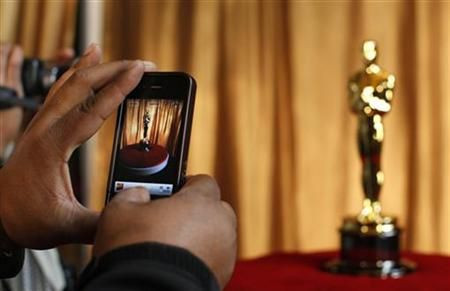Oscars 2013: A Billion People Did Not Watch The Academy Awards, So Stop Saying They Did

We’ve been hearing for years that the Oscars are so widely popular that a billion people worldwide tune in to watch the annual Hollywood awards ceremony overseen by the Academy of Motion Picture Arts and Sciences.
This claim has been touted and refuted so many times over the years that few seem to remember where it originated. An oft-cited 2005 article in the New Yorker questioning the estimate says the Academy itself rejected the number and notes “several hundred million” is a more accurate figure. The magazine points to an Associated Press story from 1985 as possibly the first reference to the estimate.
But because the number sounds sweet, the Academy does nothing to check the numerous instances over the years where actors on stage tout the number, including "Finding Nemo" co-director Andrew Stanton in 2005 and Anne Hathaway in 2011.
And the media continues to use the number to amplify the significance of its coverage.
“[British actor Daniel] Radcliffe, who made his Oscars debut this year, praised the ‘exemplary’ way that rookie Oscar host Seth MacFarlane handled the ceremony that is watched by up to one billion people globally,” said Reuters in its Monday morning after-show report.
To put things into perspective: The FIFA World Cup Germany Final in 2006 between Italy and France had a record estimated 715 million viewers worldwide. And that’s a truly global televised experience broadcast in dozens of languages and viewed by fans of all types, ages and economic and ethnic backgrounds with a shared fanaticism for the world’s most popular sport.
Unlike the Academy Awards, which would have been viewed outside of the U.S. through a patchwork of satellite-subscription television network deals, the World Cup is more broadly televised and accessible to far more interested viewers. The 2010 World Cup in South Africa took place over 31 days, in which FIFA estimates that 2.1 billion people tuned in. CNN more broadly, (and questionably), estimated that an astounding cumulative 26 billion viewers watched all 64 matches in 2010.
There's no evidence that a Hollywood-hosted self-aggrandizing English-language event would manage to pick up the roughly 960 million viewers it would need from outside of the U.S. to reach the one-billion-viewer figure.
In 1998, the Academy Awards U.S. audience peaked at 55 million. Since then, U.S. viewers have declined. From 2001 to 2012, the U.S. audience has hovered between 32 million and 43 million viewers, according to Deadline Hollywood. One reason for the declining interest could be because the world is getting younger and has more media options and preferences. Meanwhile the Academy members are staying the same old average age. (Not to mention, predominately white and male.)
“The Oscars are less relevant to a younger audience, because movies in general are less relevant,” said a Monday morning editorial in the Sydney Morning Herald. “Young people watch other screens: they play computer games, watch less television; download movies, rather than go to them; and those they do watch are not those the Oscars celebrate. Most of the academy voters, numbering just under 6,000, are over 50.”
© Copyright IBTimes 2025. All rights reserved.






















